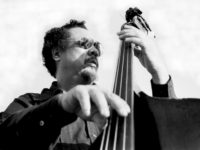It was about a year and a half ago when we studied trumpeter Christian Scott’s exciting new live document Live At Newport. This was a record I felt was a perfect manifestation of a unique and allusive style of jazz he has come up with, one that is loose, open, and nods toward present-day rock all while remaining respectful of jazz tradition. Despite the hybrid origins of his music, it sounds pure and authentic. It rewards optimum individual performances and values interaction. It pushes the music forward without trying to leave anyone behind, and it’s a great way to get the younger generations introduced to real jazz. Those are some of the reasons why I got stoked about Live At Newport, and was hoping that Scott’s followup Yesterday You Said Tomorrow, to be released Tuesday, would continue along the trail he has blazed.
I’m happy to report that it does.
For Yesterday You Said Tomorrow, Scott carries over Matthew Stevens (guitar) and the explosive Jamire Williams (drums), and replaces Aaron Parks with Milton Fletcher on piano and Joe Sanders with Kris Funn on bass. Instead of the electric atmosphere at Newport, this album was recorded at the famed Van Gelder studios in Englewood Cliffs, NJ and recorded, mixed and mastered by the illustrious Rudy Van Gelder himself. Wisely, Van Gelder retained the open, spacious and intense ambience of the live set, and there’s nothing at all to quibble about his recording and mixing job; everyone in the band gets heard in the right degree.
It’s not just the music style that is Scott’s signature approach to his craft, it’s his use of that music as a instrument to voice his thoughts and concerns. “K.K.P.D.”, the opening track, stands for “Ku Klux Police Department,” reflecting what Scott describes as the “phenomenally dark and evil” attitude taken by some members of the New Orleans police force toward African Americans while he was growing up there, and the continued such treatment by police departments in several U.S. cities. The dense, ominous melodies and unsettling polyrhyhtms echo that sentiment without dilution, and the emotion even spills out to an audience yell in the middle of Scott’s intense, open-horn solo.
“K.K.P.D” is followed by Thom Yorke’s “The Eraser,” (see video below) the title track from the Radiohead frontman’s 2006 solo record. Scott peels off the electronics of the original, leaving behind only the crucial acoustic elements of the song. Fletcher’s follows the stark piano chords virtually verbatim and Scott filters Yorke’s controlled but heartfelt vocals through his muted horn. The organic rhythm section carries out the electronic beat with more feel (natch, it’s being performed by humans, here). It’s just the kind of cover that could bring in a younger, broader audience. The placement of this song right after the turmoil of “K.K.P.D.” was intended to reboot the tone of the album, but fortunately, that doesn’t mean the emotions that drives Scott’s music subsides.
“After All,” written by Stevens, is the jazziest of the selections, with a slinky bass line, probing and thoughtful trumpet explorations by Scott and swinging counter rhythms cooked up by Williams.”Isodora,” first recorded for Newport, is a bewitching ballad that evokes the wistful side of Miles, but is distinguished from Davis by a distinctly soul feel. Unlike the live version, Scott plays his horn muted for the studio version. As before, he plays long, winsome notes that follows the unhurried nature of the melody.
Scott’s social commentary via his compositions come to the fore again starting in the album’s middle. “Angola, LA & The 13th Amendment” is a return to the dark melodies and rock currents of the first track, with the tempo slowed down to more of a grunged-out grind, and a reflective guitar solo by Stevens, contrasted by a more aggressive, angry solo by Scott. Williams, meanwhile, is laying waste to his kit, symbolizing the tension the pervades a state penitentiary. Other issues are addressed through meloncholy (“The Last Broken Heart (Prop 8)”) and mood changes (“Jenacide (The Inevitable Rise And Fall Of the Bloodless Revolution)”). Scott even hollers once again between breaths on his trumpet solo in “American’t.” Think he doesn’t mean what he says/plays?
The album ends with a couple of numbers that have an emphasis on the post-rock/alt-rock side of Scott: “An Unending Repentance” features a winding, inspired piano solo from Fletcher, most likely his best on this record. Stevens’ folky guitar is the only accompaniment for Scott’s performance on “The Roe Effect (Refrain In F# Minor),” where the leader shows off his unique whisper technique, whereby he can make his horn sound much like a whispering voice.
Like Christian Scott’s prior two albums, Yesterday You Said Tomorrow is a jazz record that’s direct, deep and lives in the present. Scott has accomplished more at 26 years old than most talented jazz artists do in an entire career. On Wednesday he reaches the ripe old age of twenty-seven. It’s hard to imagine what he will have achieved by the time he’s thirty-seven, but it will be fascinating to watch this great talent unfold even further.
- Christian Marien Quartett – ‘How Long Is Now’ (2024) - April 18, 2024
- Dave Douglas, feat. James Brandon Lewis – ‘Gifts’ (2024) - April 11, 2024
- Thollem – ‘Worlds In A Life, Two’ (2024) - April 8, 2024



